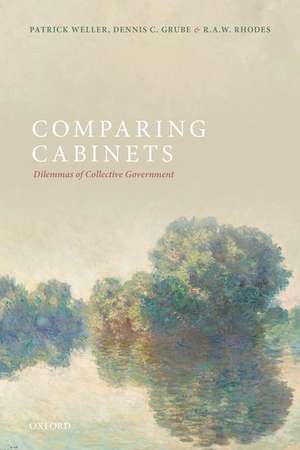Comparing Cabinets: Dilemmas of Collective Government
Autor Patrick Weller, Dennis Grube, R.A.W. Rhodesen Limba Engleză Hardback – 16 sep 2021
Preț: 581.30 lei
Preț vechi: 697.71 lei
-17% Nou
Puncte Express: 872
Preț estimativ în valută:
111.28€ • 114.51$ • 93.81£
111.28€ • 114.51$ • 93.81£
Carte disponibilă
Livrare economică 27 ianuarie-03 februarie
Preluare comenzi: 021 569.72.76
Specificații
ISBN-13: 9780198844945
ISBN-10: 0198844948
Pagini: 288
Dimensiuni: 164 x 242 x 20 mm
Greutate: 0.54 kg
Editura: OUP OXFORD
Colecția OUP Oxford
Locul publicării:Oxford, United Kingdom
ISBN-10: 0198844948
Pagini: 288
Dimensiuni: 164 x 242 x 20 mm
Greutate: 0.54 kg
Editura: OUP OXFORD
Colecția OUP Oxford
Locul publicării:Oxford, United Kingdom
Recenzii
Comparing Cabinets is a gripping account of the most secretive institution of government. Across parliamentary democracies and time it shows how Prime Ministers strive to obtain unity.
Understanding of our political institutions is often deficient, in part because we lack a perspective of understanding how these institutions perform facing similar demands abroad. Very few institutions have been longer lasting or more important in modern democracies than cabinets. This book, richly informed by evidence and specialist knowledge, brings out striking conclusions which throw important light on our understanding.
Understanding of our political institutions is often deficient, in part because we lack a perspective of understanding how these institutions perform facing similar demands abroad. Very few institutions have been longer lasting or more important in modern democracies than cabinets. This book, richly informed by evidence and specialist knowledge, brings out striking conclusions which throw important light on our understanding.
Notă biografică
Patrick Weller is Professor Emeritus in the School of Government and International Relations at Griffith University. He has written a number of books on executive government in Australia and in comparative focus, including studies of prime ministers, ministers, departmental secretaries, and central agencies. He has also co-authored four books on the working of international organizations. He is a fellow of the Academy of Social Sciences in Australia and was appointed an Officer of the Order of Australia (AO) for his contribution 'towards an understanding of executive government in Australia'.Dennis Grube is Reader in Politics and Public Policy at the University of Cambridge and a Fellow of Girton College. His recent books include Megaphone Bureaucracy: Speaking Truth to Power in the Age of the New Normal (2019) and Institutional Memory as Storytelling (with J. Corbett, H. Lovell and R. J. Scott, 2020).R.A.W. Rhodes is Professor of Government (Research) and Director of the Centre for Political Ethnography at the University of Southampton. He is the author or editor of fourty-two books including, most recently, The Art and Craft of Comparison (with J. Boswell and J. Corbett, 2019); Networks, Governance and the Differentiated Polity. Selected Essays. Volume I. (2017), and Narrative Policy Analysis (2018). He is a Fellow of the Academy of the Social Sciences in Australia, and a Fellow of the Academy of Social Sciences (UK). In 2015, the ECPR awarded him their biennial Lifetime Achievement Award for his 'outstanding contribution to all areas of political science, and the exceptional impact of his work'.
